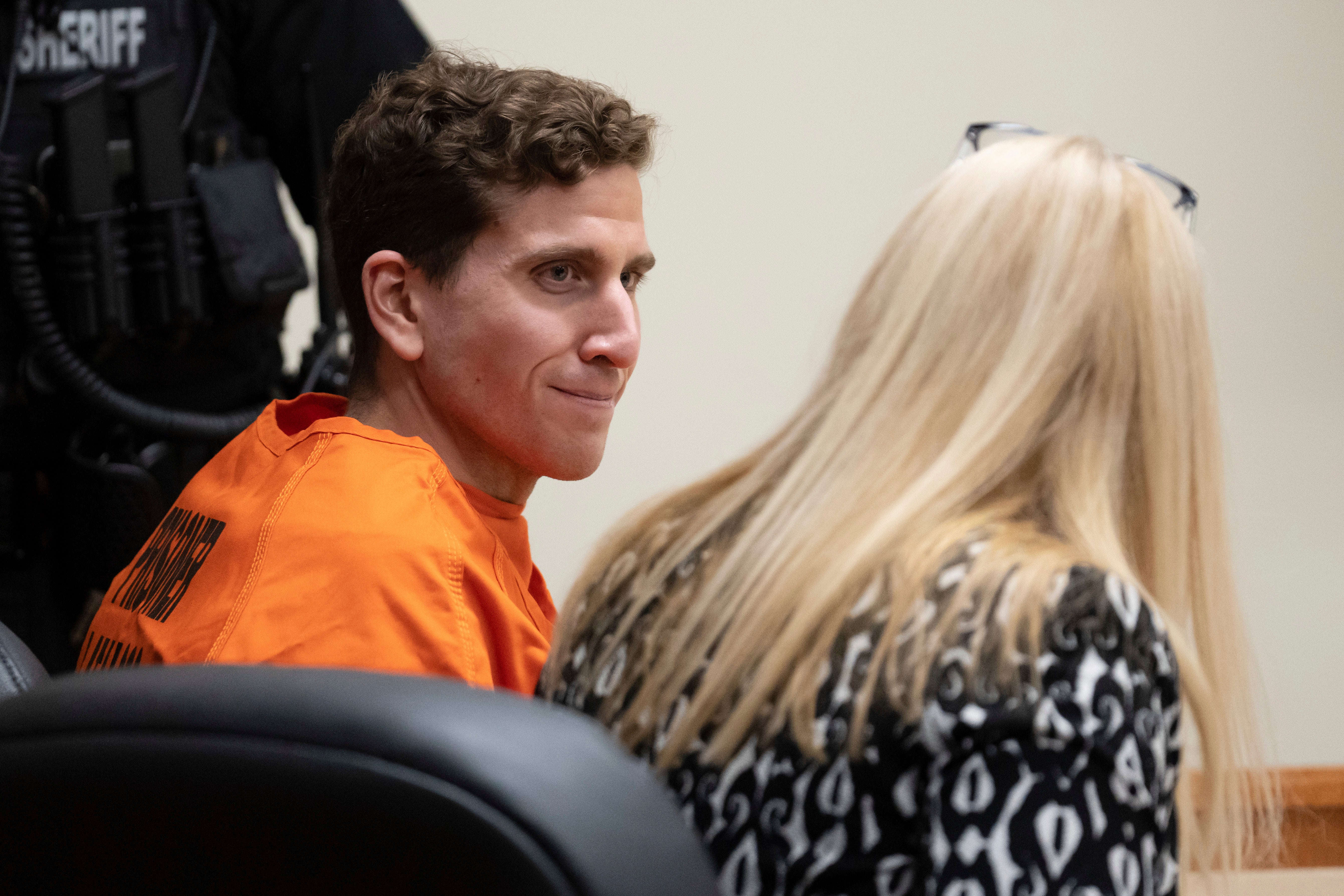Kaylee Goncalves’ family fight gag order in Idaho murders case
On 18 January, the gag order was broadly expanded to also ban any attorneys representing survivors, witnesses or the victims’ family members from talking or writing about the case
The family of slain University of Idaho student Kaylee Goncalves are fighting back against an unusually restrictive gag order placed on the case against her accused killer.
In an appeal filed in court on Friday, the Goncalves’ family attorney Shanon Gray called on the judge to pull back the scope of the gag order, describing it as unconstitutional and “facially overbroad and vague”.
A gag order was first issued in the case on 3 January, just days after Bryan Kohberger was arrested and charged with the quadruple homicide of Goncalves, Madison Mogen, Xana Kernodle and Ethan Chapin in Moscow, Idaho, on 13 November.
The initial order barred the prosecution, the defence, and law enforcement and other officials from speaking publicly about the case.
On 18 January, the gag order was broadly expanded to also ban any attorneys representing survivors, witnesses or the victims’ family members from talking or writing about the case.
In Friday’s motion, Mr Gray said that the victims’ families are not parties in the case and so should not be covered by the gag order.
“On January 12, 2023 I participated in a zoom call with Magistrate Judge Megan Marshall in which several of the victims and witnesses’ attorneys were present as well as Latah County Prosecutor’s Office and counsel for the Defendant,” he wrote.
“In that zoom call I informed Judge Marshal that my clients, the surviving family of the family of the late Kaylee Goncalves are not parties to the case and therefore are not subject to the Order. The Judge stated that she mistakenly believed that they were “parties” and were therefore subject to the Order and she instructed me to advise them.”
Mr Gray argued that the “only “parties” to the case are the People and the Defendant” and so “the Victims surviving family members are free to speak to the public and the media under the First Amendment to the Constitution”.
“Simply put, their rights to freedom of speech cannot be restricted through a judicial prior restraint,” he wrote.
The attorney went on to say that it would place an “undue burden” on the Goncalves’ family if he – as their legal representation – is not able to relay their opinions, views or statements about the case under their First Amendment rights.

“The Order is facially overbroad and vague. On its face it precludes all comments or opinions (other than reciting matters of public record), even if there is no possibility, much less “substantial probability’ of prejudicing the tribunal, and it also extends (remains in effect) even after a jury has been seated and admonished to avoid all press coverage regarding the case. As such, the Order is unconstitutionally overbroad,” he wrote.
“The point of a non-dissemination order is to protect the rights of the parties in the case and especially in criminal cases it is an attempt to preserve a fair and impartial jury pool.
“Once the jury has been selected the non-dissemination order becomes moot and therefore would not be allowed to be in full force for the ‘entirety of the case.’”
The Goncalves family members aren’t alone in their stance about the gag order, which is more highly restrictive than usual.
News organisations are also asking the judge to pull back the scope of the gag order, saying that media access to officials can provide the public with important context in such high-profile criminal cases.
The judge is yet to rule on the motions.
The conflict surrounding the gag order comes after the FBI pushed back on a report that its surveillance team “lost” Mr Kohberger while he was under surveillance for the brutal murders of four University of Idaho students.
Surveillance teams had been tasked with keeping eyes on the 28-year-old criminology PhD student after he became a “person of interest” in the 13 November murders of Kaylee Goncalves, Madison Mogen, Xana Kernodle and Ethan Chapin in Moscow, Idaho.
But, law enforcement sources told Air Mail’s “The Eyes of a Killer: Part Two” that in the early hours of 13 December, Mr Kohberger set off on a cross-country drive with his father from Washington State University (WSU) to his family home in Pennsylvania and the surveillance team “lost” him.
The sources admitted that Mr Kohberger managed to slip the net almost as soon as his white Hyundai Elantra pulled out of the parking lot at his graduate housing complex.
For the next “several alarming hours – or more,” the man believed to have brutally stabbed the four students to death had “seemingly vanished,” the outlet reported.
Investigators desperately scoured automated licence-plate readers (ALPRs) in nearby states to try to find any signs as to Mr Kohberger’s car driving through.

Hours later, the car finally pinged in Loma, Colorado – around 900 miles away and a 15-hour drive from Pullman – and the surveillance operation resumed.
However, on Thursday an FBI spokesperson denied the shocking account calling it “false information” which “is not helpful to the case against Kohberger or to the American public”.
“The FBI is aware of reports detailing alleged FBI surveillance on Idaho murder subject Brian Kohberger,” the spokesperson said in a statement.
“There are anonymous sources providing false information to the media.
“Publishing of false information attributable to anonymous sources is not helpful to the case against Kohberger or to the American public.”
During the 2,500-mile cross-country journey to Pennsylvania, Mr Kohberger and his father were pulled over by police twice while driving through Indiana.
Both stops took place just minutes apart on 15 December – one time by county police and the other by state police – for driving too close to a vehicle in front.
Bodycam footage was previously released from both traffic stops, showing a startled Mr Kohberger behind the wheel of his white Hyundai Elantra and his father in the passenger seat.
At the time, law enforcement and the wider public had been told to be on the lookout for a white Hyundai Elantra in connection to the Idaho murders.
But in both cases, the father and son spoke cordially with the officer who then let them go with a warning – and appeared to make no connection to the wanted vehicle.
After reaching the family home near the Poconos mountains, Mr Kohberger continued to be kept under surveillance.
One night, he was spotted dumping trash in a neighbours’ bin.
The trash was seized and DNA evidence found on it was used to tie him to a knife sheath left behind by the killer at the victims’ home, according to an affidavit.
On 30 December, Mr Kohberger was finally arrested in an early-morning raid on the family home. He is now behind bars in Moscow charged with murder.
The affidavit, released in January, gave new details about what led investigators to the suspect but still offered no connection between the victims and Mr Kohberger.
The bombshell documents did reveal that investigators believe Mr Kohberger may have stalked the student home in the run-up to the mass murder, with cellphone data placing him around the property 12 times before 13 November.
At the time of the murders, investigators believe Mr Kohberger turned his cellphone off in order to try to avoid detection.
However, cellphone data places him close to the home on King Road at around 9am on 13 November – suggesting that he returned to the scene of the crime just hours after allegedly murdering the four victims at around 4am, the affidavit reveals.
As well as cellphone data, the affidavit reveals that other evidence also led them to arrest Mr Kohberger for the student murders.
Police said that his DNA was found on a knife sheath left behind at the scene by the killer and his white Hyundai Elantra was caught on surveillance footage at the crime scene at the time of the murders, the affidavit reveals.
One of the victims’ surviving roommates was also able to partially describe the killer to investigators after she came face to face with him in the aftermath of the murders.
Earlier this month, police in Washington unsealed search warrants for Mr Kohberger’s apartment in Pullman and his office at Washington State University (WSU).
The searches were carried out on 30 December – the same day that he was taken into police custody in Pennsylvania.
The unsealed documents reveal that investigators seized a string of items from his home including possible human and animal hair strands, a disposable glove, items with red and brown stains and a computer.
No items were seized from his office which he shared with other PhD students.
The murder weapon – a fixed-blade knife – was not recovered during the searches and it is still unclear where it may be.
No motive has been given for the attack.
Mr Kohberger is next scheduled to appear in court on 26 June for his preliminary hearing.
The entire week has been set aside for the hearing – when evidence of the case against Mr Kohberger will be laid out for the first time in court and Mr Kohberger is likely to enter a plea on the charges.
Until then, Mr Kohberger will be held behind bars at Latah County Jail after he was ordered to be held on no bail for a second time.
As a criminal justice PhD student at WSU, he lived just 15 minutes from the victims over the Idaho-Washington border in Pullman. He had moved there from Pennsylvania and began his studies there in August, having just completed his first semester begore his arrest.
Before this, he studied criminology at DeSales University – first as an undergraduate and then finishing his graduate studies in June 2022.
While there, he studied under renowned forensic psychologist Katherine Ramsland who interviewed the BTK serial killer and co-wrote the book Confession of a Serial Killer: The Untold Story of Dennis Rader, the BTK Killer with him.
He also carried out a research project “to understand how emotions and psychological traits influence decision-making when committing a crime”.
Now, he is facing life in prison or the death penalty for the murders that have rocked the small college town of Moscow and hit headlines around the globe.




